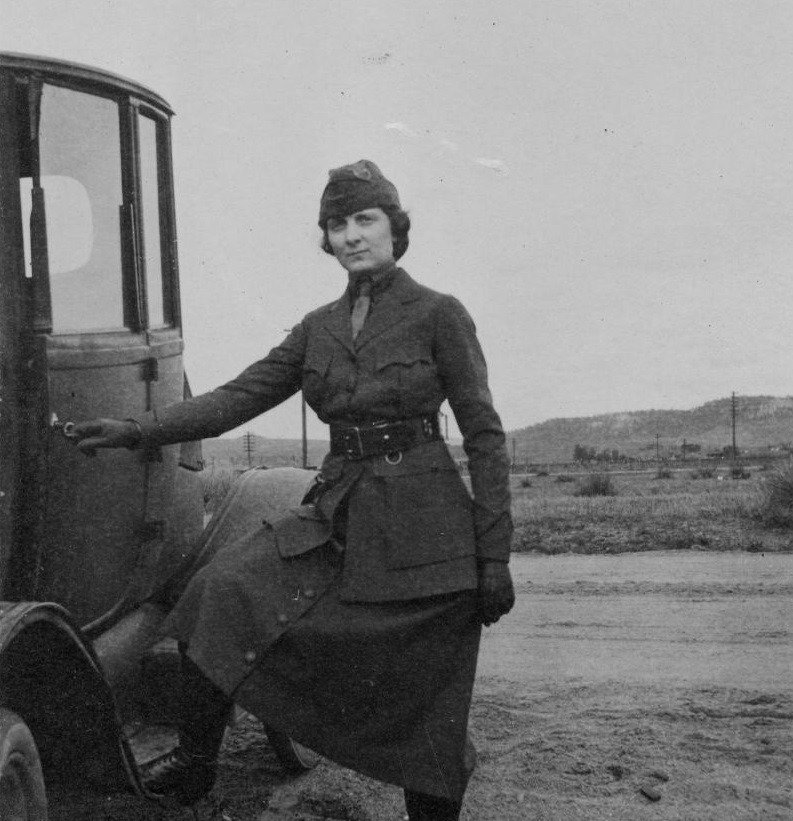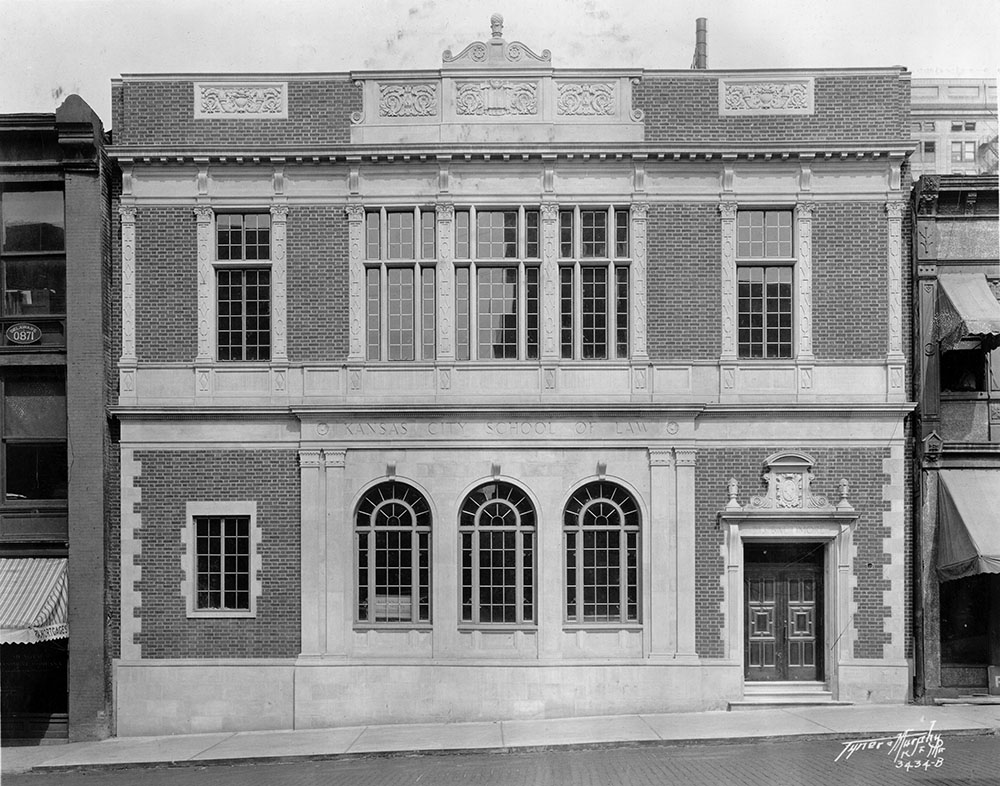The Dean of Women Lawyers
On November 8, 1917, Mary Tiera Farrow and 20 other female lawyers formed the Women's Bar Association of Kansas City. Farrow was one of the few women in the United States who successfully practiced law in the early 1900s despite the discrimination that women faced in the legal field and society more generally. After having been denied the professional benefits of joining any existing bar association, Farrow led a group of 20 women in establishing their own bar in Kansas City. It was just one of many pioneering acts that Farrow undertook for herself and for women's rights more generally.

Tiera Farrow was born in Indiana in 1880 and moved with her family to Delphos, Kansas, in 1885. Her personal hero was Abraham Lincoln, who had been a lawyer before he entered politics. From an early age, Farrow was determined to follow in his footsteps despite the fact that there were virtually no female lawyers in existence. At the age of 10, she opened her own ice cream parlor alongside her father's general store.
Always patriotic, Farrow longed to fight in the Spanish-American War, but women were of course not allowed. Instead, she convinced her parents to let her attend business school in Kansas City, Missouri, so that she could become a stenographer. After being denied entrance at several law schools, she finally was allowed to enroll at the Kansas City School of Law in 1901. There she learned the full extent of discriminatory laws against women.

Farrow's greatest challenge came after graduating from law school in 1903. Her fiancé had demanded that she work as a clerk for his firm rather than practice law herself, so she ended the engagement. She found work assisting other attorneys, but she earned a meager salary. In this position she did become the first woman to argue a case before the Kansas Supreme Court, and in 1907 she was elected Kansas City's first city treasurer and served two terms.
After a trip through Europe and North Africa, she and Anna Donahue, another Kansas City School of Law graduate, opened Kansas City's first woman-owned law firm. Work was plentiful, but the pay was meager because their clients either lacked money or assumed that female lawyers would be willing to work for much less money than male lawyers. In 1916, not long after Donahue left the firm and moved to New York, Farrow took on her most memorable case. She defended a woman named Clara Schweiger, who had murdered her husband in the courthouse corridor after divorce proceedings had ruled in his favor. The local newspapers treated the case as an exciting novelty and noted that it was the first trial in American history in which a female lawyer defended a female client in a murder case. Farrow skillfully managed to persuade the jury to rule it a second, rather than first, degree murder. Mrs. Schweiger only ended up serving two years in prison.
Even after all of this legal experience, Farrow was still barred from joining the all-male Kansas City Bar Association. Never deterred from being a trailblazer, she organized a group of women who had also obtained law degrees to discuss the possibility of forming their own bar association. Farrow was still the only woman in Kansas City who actually had her own practice. The United States had entered World War I, and the women decided that the stated goal of their organization would be provide free legal advice to those in need during the time of war. They hoped that this pretext would later gain momentum for a state bar association for women.
Some women at the meeting dissented, arguing that women should demand the right to join the existing men's bar associations. Undeterred, Farrow and 20 others founded the Woman's Bar Association of Kansas City on November 8, 1917. They then worked with a similar bar association in St. Louis, and on March 27, 1918 the Women's Bar Association of Missouri was founded.
After these accomplishments, Farrow helped in recruiting for the National Guard Association for World War I, and she drove an ambulance for the National League of Women's Service. Following the war, she took a break from the law and went to the University of Illinois and earned a degree in sociology, followed by a master's degree from Columbia University. She then practiced criminology for a time before returning to her law firm. In the 1920s, she and a partner taught introductory legal classes to women aspiring to enter the professional field, effectively becoming one of the first female instructors at a professional school. She went on to serve as the first female judge for the Kansas City Municipal Court. When the United States entered World War II, Farrow joined the Red Cross and offered free legal service to soldiers and their families.
Tiera Farrow never grew famous outside of the Kansas City area, but her accomplishments were quite influential in the legal profession. While female lawyers would have to wait another fifty years to gain equal rights to men in the legal profession, women in the state of Missouri at least had access to their own bar association after 1917; one of the first of its kind in the nation. Women in other states followed in her footsteps and slowly pried their way into the legal profession. Tiera Farrow certainly earned her nickname that was coined by the 1950s: the "Dean of Women Lawyers." Retiring in 1957, Mary Tiera Farrow finally entered a less-eventful phase of her life. She died in 1971 at the age of 91.
Read full biographical sketches of Tiera Farrow and other early woman attorneys in Kansas City, prepared for the Missouri Valley Special Collections, the Kansas City Public Library:
- Biography of Mary T. Farrow (1880 - 1971), attorney, by Susan Jezak Ford.
- Biography of Leona Pouncey Thurman (1911-1985), attorney, by Kimberly R. Riley; Thurman was the first African American female lawyer in Kansas City.
View images of Tiera Farrow that are a part of the Missouri Valley Special Collections:
- The Kansas City School of Law, where Farrow attended law school
- Kansas City Bar Association Former Presidents, 1914
- Kansas City Municipal Court; where Farrow served as judge in the 1930s
Check out the following books and articles about Tiera Farrow, held by the Kansas City Public Library:
- Lawyer in Petticoats, by Tiera Farrow; an autobiography.
- "But I'm Only a Woman: Tiera Farrow's Defense of Clara Schweiger," by Gerald R. Butters, in Kansas History, Autumn 2002.
- Kansas City Women of Independent Minds, by Jane Fifield Flynn; contains a photograph and a short biography of Mary Tiera Farrow, pp. 56-59.
- "Women Lawyers In and Around Kansas City," by Kathryn Worley, in The Westporter, March 2005.
References:
Jane Fifield Flynn, Kansas City Women of Independent Minds (Kansas City, MO: Fifield Publishing, 1992), 56-59.
Dawn Bradley Berry, J.D., The 50 Most Influential Women in American Law (Chicago: Contemporary Books, 1996), 75-83.
Tiera Farrow, Lawyer in Petticoats (New York: Vantage Press, 1953), 118-123.
Susan Jezak Ford, "Biography of Mary T. Farrow (1880 - 1971), attorney," the Missouri Valley Special Collections, the Kansas City Public Library, 1999.


